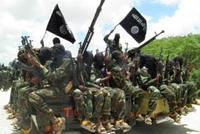-
FBI’s eGuardian integrated with Memex Patriarch
Deployed over the last three years, FBI eGuardian is a nationwide Suspicious Activity Reports (SARs) system focused on counterterrorism tips and leads; the agency has now integrated eGuardian with Patriarch Intelligence Management Platform from Memmex
-
-
Terrorists using sophisticated uni-directional bombs
Terrorists have learned to develop increasingly sophisticated explosives as evidenced by the uni-directional bombs detonated last week in Karachi, Pakistan that killed three Pakistan Rangers and injured several others
-
-
Minnesota banks to stop money transfers to Somalia

In an effort to cut off funds to Somali terrorists, banks in Minnesota will no longer support money transfers via local businesses called “hawalas”; Minnesota has the largest concentration of Somalis in the United States and officials fear that money sent from relatives living in the United States could be funding terrorist groups like al Shabaab
-
-
White House offers details of plans to fight homegrown terrorism
The White House yesterday unveiled a broad, new strategy to battle homegrown terrorism in the United States. The program empowers communities by teaching local officials to recognize violent extremism and see the threat as a public safety issue, like the battle against gangs and drugs. The 20-page White House strategy, entitled “Strategic Implementation Plan for Empowering Local Partners to Prevent Violent Extremism in the United States,” adds details to the outline the administration released four months ago.
-
-
The threat to military communities inside the United States

The Majority Staff of the House Committee on Homeland Security has released a report on threats to the security of military communities in the United States; the report says that 70 percent of the plots against military targets occurred since mid-2009 — including the two successful homeland attacks since 9/11
-
-
Safer fertilizer technology

Honeywell will build a facility in California to produce a fertilizer with the agronomic benefits of traditional nitrate-based fertilizers, but with significantly lower explosive potential; the new fertilizer was independently tested, with guidance from the DHS and the Bureau of Alcohol, Tobacco, Firearms and Explosives, and demonstrated significantly less or no explosive power
-
-
Nigerian Islamist terrorists and U.S. security
Boko Haram is an Islamist religious sect that formed in the northern part of Nigeria, Africa’s leading oil producer, in 2002. Its Hausa-language name means “Western education is sin.” The group’s continuing attacks on Western targets in Nigeria and a death toll reaching 330 people in 2011 have made U.S. lawmakers and security experts take notice.
-
-
CIA terror plot-tracking technology is intriguing, worrisome
A program developed by Palantir Technologies for PayPal is now used by intelligence and law enforcement agencies. It allows the CIA to detect a terrorist plot in the making, and do so without subjecting the general public to intrusive measures.
-
-
Indiana sheriffs use video conferencing to reduce costs
In an effort to reduce costs, officials in Tippecanoe County, Indiana have begun using video conferencing technology to hold court hearings without transporting the defendant to the courtroom
-
-
LAPD named best counterterrorism squad
The Los Angeles Police Department’s (LAPD) Counter-Terrorism and Special Operations Bureau (CTSOB) recently received Government Security News’ highest honor for a division of its kind
-
-
NYPD spying on Muslims leads to spiral of mistrust
Following the revelation that the New York City police department was spying on the daily lives of ordinary Muslims, community activists have launched a campaign encouraging people to avoid directly reporting suspicious activity to the police
-
-
Cyber attacks on critical infrastructure reach U.S.
Most of the U.S. critical infrastructure is run by computers which are connected to the Internet; this makes them susceptible to cyber attacks; a few days ago the control system of a water pump in Illinois was taken over by a hacker’s remote command, and then deliberately destroyed; what critical infrastructure facilities will hackers — nerdy teenagers, terrorists, or intelligence operatives of other nations — target next?
-
-
Terrorist attacks and the false specter of security
With the recent passing of the tenth anniversary of the creation of the Transportation Security Administration, the United States would benefit greatly from a candid discussion on the nature of terrorism and the current rhetoric surrounding it; the fact is, no wall, law, or interrogation technique will keep us 100 percent safe from violent terrorist acts; the sooner we acknowledge this morbid reality, the sooner we can begin focusing on a long under-emphasized aspect of counterterrorism: the psychological dimension of terrorism – an area where we are losing ground
-
-
Domestic terrorist on FBI wanted list may be in Massachusetts

The FBI believes they may have found Daniel Andreas San Diego, the first domestic terrorist to be placed on the FBI’s Most Wanted Terrorist list, in Northampton, Massachusetts; San Diego is wanted for bombing two companies in 2003 that were related to a firm that engaged in animal testing and there is currently a $250,000 reward for information leading to his arrest
-
-
Cyber attacks on critical infrastructure reach U.S.
Most of the U.S. critical infrastructure is run by computers which are connected to the Internet; this makes them susceptible to cyber attacks; a few days ago, the control system of a water pump in Illinois was taken over by a hacker’s remote command, and then deliberately destroyed; what critical infrastructure facilities will hackers – nerdy teenagers, terrorists, or intelligence operatives of other nations – target next?
-
More headlines
The long view
What Does Netflix’s Drama “Adolescence” Tell Us About Incels and the Manosphere?
While Netflix’s psychological crime drama ‘Adolescence’ is a work of fiction, its themes offer insight into the very real and troubling rise of the incel and manosphere culture online.
